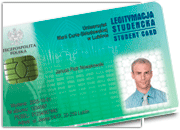
The eventual goal is interoperability, but issuing the card and adding functionality is first
By Andy Williams, Contributing Editor
In the past 18 months, two companies have issued more than one million dual-interface smart card IDs to students of 450 universities, colleges and high schools. Interoperability of the applications between the different institutions hasn’t happened yet but it may be on the horizon.
The Polish government thought a smart card student ID system could enable interoperability between universities and make it easier to identify students.
“Universities dream about interoperability, but they approach it carefully,” says Jacek Blahut, IT systems director responsible for development and sales of card-based systems at OPTeam, the Rzeszów, Poland company responsible for the student ID card deployment. “They make small steps, like one university makes its library available to students from other universities in the city using their student card as a library ID. It requires some decisions, setting up some procedures and integrating several library and campus card systems, but they can do it, with our help.”
According to Blahut, OPTeam specializes in implementing card-based systems for financial institutions, corporations, retailers, universities and governments. Its university campus card system goes by OPTIcamp. “We have been dealing with smart card technology since 1996 and we implemented the first campus card system in Poland in 1999,” says Blahut.
While a smart card student ID system is not mandatory, the Polish government recommends it, says Blahut. “A paper ID is still valid and some universities issue paper student IDs instead of a smart card,” he says. “The important fact is that the new card entitles its users to discounts in public transportation. That is why universities wanted one card only, for both campus purposes and a nationwide student ID recognized in public transportation.”
Prior to the introduction of the smart student ID card, students had to use two documents, a paper student ID that is useable in public transit, and a smart card used only in campus card systems, he says.
OPTeam is a value-added reseller of Gemalto, which provided the cards. OPTeam then personalized the cards for the colleges and schools. Large-scale deployment started last fall.
“About 80 universities use our campus card system,” says Blahut. “There are 1.9 million students in Poland and we have delivered one million student cards to universities. We are now in the process of implementing four more campus card systems, which are supposed to start at the end of September and we are negotiating with several more. And those systems already implemented will continue to evolve by adding new functions and services.”
OPTeam’s campus card solution provides the student card personalization. “We also set up the whole personalization system (software, hardware, procedures) in the university. Most universities built their own personalization centers. Some small universities use personalization centers of other universities,” says Blahut.
He says new functions are gradually being added to the student ID cards. “Universities build functionality of their campus card systems separately, but we are now starting several projects in which certain functions available at one university will be offered to students at other universities, like libraries or bike rental systems.
While many of the cards do include electronic purses, they are not bank cards, Blahut emphasizes. That’s because the cards don’t match the requirement of payment organizations like Visa or MasterCard. “Some universities use student cards for building local e-purse systems, such as payment for prints and photocopies, vending machines and other items.”
Some universities are incorporating digital signature applications into their student cards. “Universities usually set up their own certificate authority systems and use the digital certificate internally for logging in to workstations or integrating it with their back office systems,” Blahut says.
The digital signature can also enable students to electronically sign documents, sparing them the hassle of having to go to a university office to handle paperwork. With the authentication capability, students can also gain access to specific documents on the university’s computers and to the information kiosk, which provides course details.
In addition, Poland’s national ID card is supposed to include a digital signature. “So the question is where to put my digital signature, on my student card or on my national ID,” says Blahut. “Tests using a student card as a carrier of a common digital certificate are underway we should know the best solution in several months.”
All cards supplied to the universities are hybrid, dual interface cards capable of both contact and contactless transactions, says Blahut. “The contactless part of the card is used for door access mostly, but there are projects starting now where it is also used for identification in a library and for a local e-purse,” he says.
“In some cities, such as Warsaw, Krakow, Gdansk, Poznan and Lublin, public transport tickets are stored in the contactless part of the card. These electronic ticketing systems are different in all these cities so if you are studying in Warsaw and your card is working within the Warsaw electronic ticketing system, you can’t use it in any other city,” adds Blahut. “But all universities located in any of these cities – for example, there are about 10 universities in Lublin and dozens in Warsaw – may issue student cards, which can be used as carriers of electronic tickets in a given city.”
Choosing a vendor
The universities choose Gemalto because they best product available for the job. The specs were routine, such as meeting ISO 7816 requirements, says Blahut. “Gemalto offered a sophisticated hybrid card, a Java based GemXpresso card, with cryptographic applets and an additional contactless Mifare chip, with a price which was not available from other manufacturers,” he adds.




